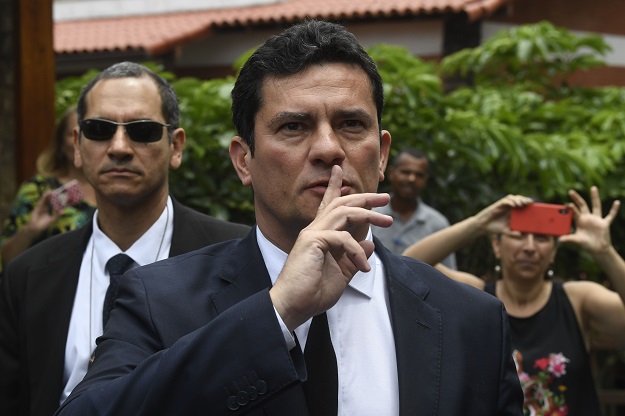Two words help explain why Sérgio Moro decided to risk everything, and accept President-elect Jair Bolsonaro’s offer to become Brazil’s next justice minister:
Mani Pulite.
The Italian political corruption probe (known as “Clean Hands” in English) seemed like a game-changer when it first erupted in the early 1990s. The investigation resulted in hundreds of arrests, put nearly half of Italy’s Congress under indictment and caused an entire generation of politicians to lose their jobs. But it didn’t take long for the establishment and criminal networks to strike back. Corruption in Italy was worse by the late 2000s than it had been prior to Mani Pulite, multiple studies suggested. Rather than elect a clean new leader, Italians ended up with Silvio Berlusconi instead. Many wondered if there had been any point to the case at all.
In 2004, a decade before the “Car Wash” corruption case in Brazil began, Moro published a now-famous article in a legal journal analyzing Mani Pulite and its (qualified) successes. He called it “one of the most impressive judicial crusades” ever, and expressed regret that nothing similar had ever happened in Brazil. As Car Wash expanded under Moro’s guidance, and followed Mani Pulite’s path in eerie and entirely intentional ways, he had the opportunity to meet several of the aging Italian jurists responsible for the probe. In emotional conversations, they lamented that their efforts had not been accompanied by the kinds of concrete judicial and political reforms that could have potentially yielded lasting progress.
In ensuing years, Moro has spoken often, privately and publicly, of the need to ensure that corruption in Brazil declines in a meaningful way – to ensure that Car Wash does not meet Mani Pulite’s fate. That mission, above all else, led him on Thursday to declare he would resign as a judge and accept a position in Bolsonaro’s cabinet. “In practice, (this decision) means consolidating the advances against crime and corruption of recent years and reducing risks of setbacks for the greater good,” Moro said in a statement.
Outsiders sometimes forget Moro, 46, was a relatively junior judge in a mid-sized Brazilian city, Curitiba. Starting in January, he will have more power than any justice minister in the country’s recent history – including control of the financial crimes unit (previously under the purview of the finance ministry) and Brazil’s Federal Police, which plays an important investigative role in corruption cases. But Moro’s main objective will be to pass anti-corruption reforms. When he flew to Rio on Thursday to meet Bolsonaro, he was carrying a book with more than 70 concrete proposals, produced by Transparency International and Fundação Getúlio Vargas, a Brazilian think-tank. (The measures include the creation of a single portal for tracking government procurement, among others.) The president-elect told Moro he would have “total freedom” to implement his agenda. “Even if he comes to get somebody in my family in the future,” Bolsonaro said, “I don’t care.”
Regardless of Moro’s actual intentions, accepting the job carries a severe cost. It irretrievably rewrites the history of Car Wash, disappoints even many of his supporters, and gives ammunition to critics who have insisted the investigation was political all along. The record will show that Moro jailed Bolsonaro’s main political rival, former President Luiz Inácio Lula da Silva, and then just months later accepted a job in Bolsonaro’s government.
Yes, Lula’s sentence was upheld unanimously by a three-man appeals court. Yes, various other tribunals, including Brazil’s Supreme Court, have rejected motions that could have set Lula free. Yes, Car Wash has brought criminal charges against more than a dozen different political parties across the ideological spectrum, not just the Workers’ Party. But perceptions matter, as Moro himself noted in an interview with Veja magazine in 2017: “It wouldn’t be appropriate on my part to present myself for any kind of political position, because this could, let’s say, put in doubt the integrity of the work I’ve done up until now.”
The Sérgio Moro of 2018 does not suffer from amnesia. He simply concluded that the potential benefits of accepting the position outweigh the risks. But there are plenty of the latter, beyond just the legacy of Car Wash. Bolsonaro has demonstrated authoritarian tendencies, and his security policies seem likely to generate increased bloodshed and human rights abuses once he takes office on Jan. 1. Others worry about oppression of political opponents and the media. Moro has promised friends he will use his new position to uphold both democracy and the Constitution. But the experience of Bolsonaro’s professed idol Donald Trump shows how self-appointed “adults in the room” like James Mattis or H.R. McMaster can get trampled and ultimately ignored. No matter what guarantees Moro received, there is only one president. He may well come to regret hitching his star to this one.
Finally, it is worth wondering whether Moro learned the right lessons from Mani Pulite. Antonio di Pietro, probably the most famous magistrate in that case, also embarked on a political career (he ran for Italy’s Senate) after insisting for years that doing so would be a mistake. Some historians believe that the politicization of Mani Pulite was, in fact, even more deadly to its legacy than a lack of specific reforms. Moro believes, with some justification, that his unique biography and still-considerable popularity make him the best person in Brazil to guarantee Car Wash’s lasting success. But if he’s wrong, history may repeat itself – or worse.









